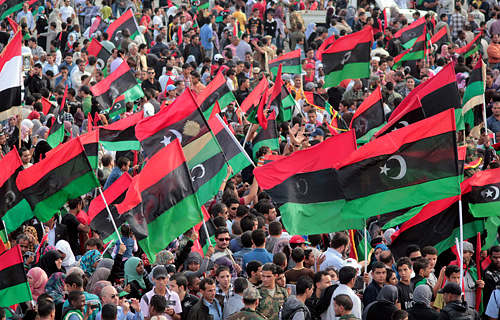 |
|
CELEBRATION: Libyan people wave their new national flag to celebrate the fall of the Muammar Gaddafi regime in Benghazi on October 23 (XINHUA/AFP) |
Emerging countries rely on the BRICS (Brazil, Russia, India, China and South Africa) and BASIC (Brazil, South Africa, India and China) platforms, while Western countries rely on the Group of Eight and NATO. The two blocs have competed on a number of issues. For instance, on the Middle East turmoil, BRICS insisted on safeguarding state sovereignty and non-interference in internal affairs while the West intervened in Libya's civil war through the use of force and sought to dominate the "new Middle East."
The BRICS also disagreed with the West on the selection of a new IMF managing director and capital injection into the fund with the aim of increasing the voice of developing countries in global economic governance. In addressing global climate change, emerging countries urged industrialized countries to fulfill legally binding greenhouse gas emission reduction targets, while developed countries tried to shun their responsibilities.
In 2012, the two sides will continue to compete in a wide range of areas. And emerging countries will make joint efforts to resist the Western powers' attempts to transfer their economic crisis to developing countries.
The international security situation was severe and complicated in 2011. Regional conflicts continued in hot spots around the world. Turmoil in the Middle East triggered military intervention from Western powers. The United States smartly toppled the Gaddafi regime by virtue of NATO forces. Terrorist activities are constantly on the rise in Afghanistan and its border with Pakistan. The security situation in the region is still worrisome 10 years after the United States launched an antiterrorism war in Afghanistan.
The world arms race remains fierce as many countries are increasing their investment in new military equipment research and development. Though financially strained, the United States has continued to conduct research, development and application of sophisticated weapons, trying to maintain its military supremacy. Russia has vehemently opposed Washington's deployment of anti-missile systems in Europe.
The competition in cyberspace has heated up. The United States has tried to play a dominate role in cyberspace rule-making. It has also put cyberspace on a par with land, sea, air and outer space as a theater of war.
Non-traditional security challenges were also beyond count in 2011. The March 11 earthquake and tsunami and ensuing radiation leaks in Japan severely impacted the global industrial supply chain. The nuclear disaster has sparked widespread concern over nuclear safety. As many countries consider abandoning nuclear energy, the global energy industry faces adjustments.
Although U.S. forces killed Al Qaeda leader Osama Bin Laden in May, Western countries face mounting threats from homegrown terrorists. In the Middle East and South Asia, terrorist activities remain unchecked.
In addition, the overturn of the Gaddafi regime after it abandoned its nuclear program may complicate efforts to solve nuclear issues in Iran and North Korea.
The rapid development of Asian emerging economies has led to a shift of the world's geopolitical focus to the east. Major powers are all asserting themselves in the region. The United States has vowed to give priority to the region in the next decade. This year, it took part in the East Asia Summit for the first time after hosting the APEC Summit.
The United States is striving to remodel Asia-Pacific cooperation by promoting the Trans-Pacific Partnership, trying to seize a larger market in the Asia-Pacific region. Employing maritime disputes in East Asia, it is also attempting to seize a dominant position in regional affairs with its military superiority. Washington's bolstered presence in the Asia Pacific is likely to do more harm than good to regional stability.
Japan has tried to consolidate its alliance with the United States while reaching out to its Asian neighbors to strengthen its influence in the region. Russia, with its military and energy clout, has also expanded its regional interests. To maximize their own interests, ASEAN countries have adopted a "balance of power" strategy in regional affairs.
As the Philippines and Viet Nam attempt to make the South China Sea an international issue, the United States has weighed in, declaring that it has a "national interest." Japan and India have also gotten involved in oil and gas exploitation in the area.
On the Korean Peninsula, the death of Kim Jong Il has delayed progress on the six party talks. With the withdrawal of U.S. troops from Afghanistan, extremists could become more active in the war-torn country. U.S. air strikes on targets within Pakistan's borders have badly hurt U.S.-Pakistani relations.
The author is a research fellow with the China Institutes of Contemporary International Relations | 